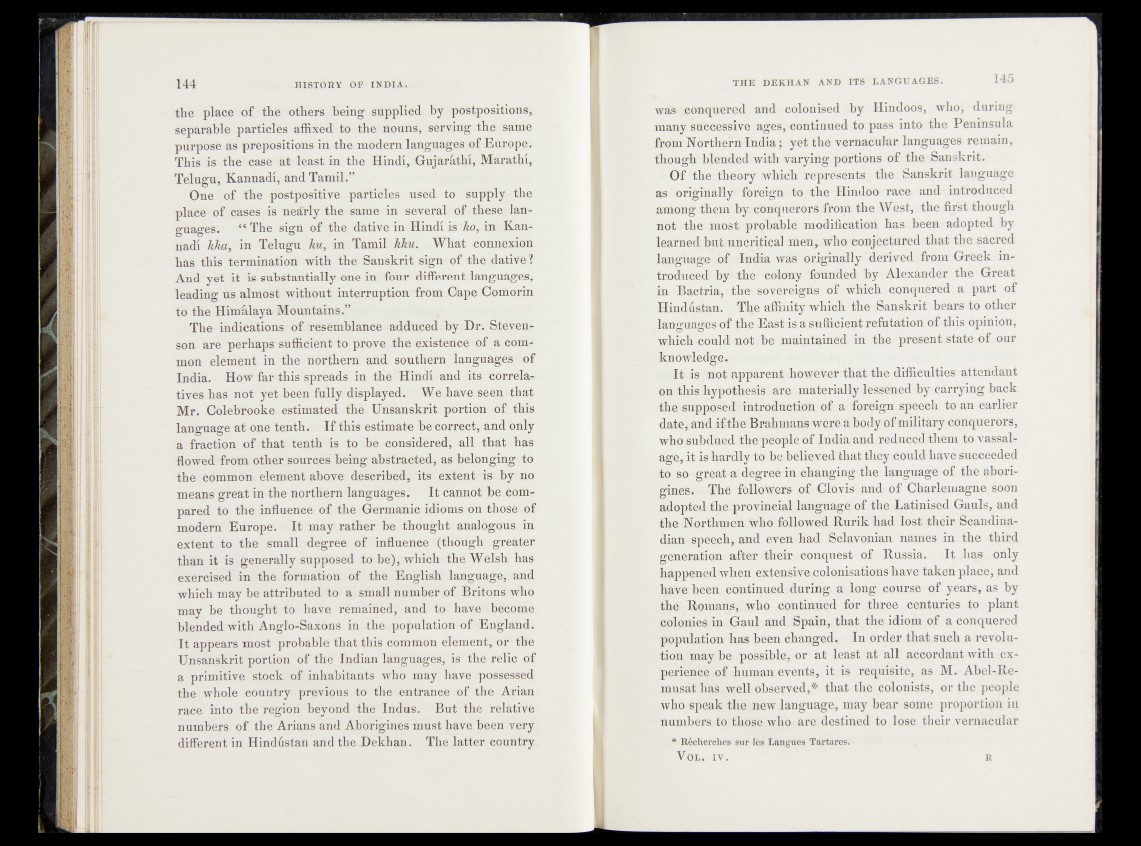
the place of the others being supplied by postpositions*
separable particles affixed to the nouns, serving the same
purpose as prepositions in the modern languages of Europe,
This is the case at least in the Hindi, Gujar&thi, Marathi,
Telugu, Kannadi, and Tamil.”
One of the postpositive particles used to supply the
place of cases is nearly the same in several of these languages.
“ The sign of the dative in Hindi is ko, in Kan-
nadi kka, in Telugu ku, in Tamil kku. What connexion
has this termination with the Sanskrit sign of the dating ?
And yet it is substantially one in four different languages,
leading us almost without interruption from Cape Comorin
to the Himalaya Mountains.”
The indications of resemblance adduced by Dr. Stevenson
are perhaps sufficient to prove the existence of a common
element in the northern and southern languages of
India. How far this spreads «in the Hindi and itsHsorrela^
tives has not yet been fully displayed. We haveseen that
Mr. Colebrooke estimated the Unsanskrit portion of this
language at one tenth. If this estimate be correct, and only
a fraction of that tenth is to be considered, all that has
flowed from other sources being abstracted, as belonging to
the common element above described, its extent tis$ by no
means great in the northern languages. It cannot be compared
to the influence of the Germanic idioms on those of
modem Europe. It may rather be thought analogous in
extent to the small degree of influence (though greater
than it is generally supposed to be), which the Welsh has
exercised in the formation of the English language, and
which may be attributed to a small number of Britons who
may be thought to have remained, and to have become
blended with Anglo-Saxons in the population of England.
It appears most probable that this common element, or the
IJnsanskrit portion of the Indian languages, is the relic of
a primitive stock of inhabitants who may have possessed
the whole country previous to the entrance of the Arian
race into the region beyond the Indus. But the relative
numbers of the Arians and Aborigines must have been very
different in Hindustan and the Dekhan. The latter country.
was conquered and colonised by Hindoos, who, during
many successive ages, continued to pass into the Peninsula
from Northern India; yet the vernacular languages remain,
though blended with varying portions of the Sanskrit.
Of the theory which represents the Sanskrit language
as originally foreign to the Hindoo race and - introduced
among them?by conquerors from the West, .the first though
not the most probable modification has. been adopted by
learned but .uncritical men, who conjectured that the sacred
language of India was originally derived from Greek introduced
by the colony founded by Alexander the Great
in Bactria, theesovereigns of which conquered a part of
Hindustan. The affinity which the Sanskrit bears to other
languages of the East is a sufficient refutation of this opinion,
which could not be maintained in the present state of our
knowledge.
It is not apparent however that the difficulties attendant
on this hypothesis are materially lessened by carrying back
the supposed introduction of a foreign speech to an earlier
date#5Éid ifithe Brahmans were a body of military conquerors,
who subdued the people of India and reduced them to vassalage,
it is hardly to be believed that they could have succeeded
to so great a degree in changing the language of the aborigines.
- The followers of Clovis and of Charlemagne soon
adopted the provincial language of the Latinised Gauls, and
the Northmen who followed Rurik had lost their Scandina-
dian speech, and even had Sclavonian names in the third
generation after -their conquest of Russia. It has .only
happened when extensive colonisations have taken place, and
have been continued during a long course of years, as by
th£ Romans,; who continued for three centuries to plant
coloiiies in Gaul and Spain, that the idiom of a conquered
population has been changed. In order that such a revolution
may be possible, or at least at all accordant with experience,
of human events, it is requisite, as M. Abel-Re-
musat has well observed,* that the colonists, or the people
who speak the new language, may bear some proportion in
numbers to those who. are destined to lose their vernacular
* Récherches sur les Langues Tartares.
V ol. i v . R